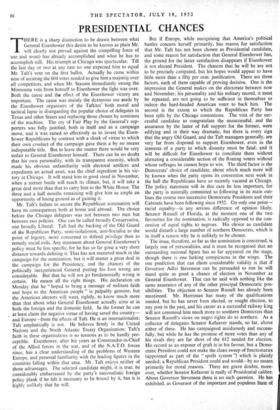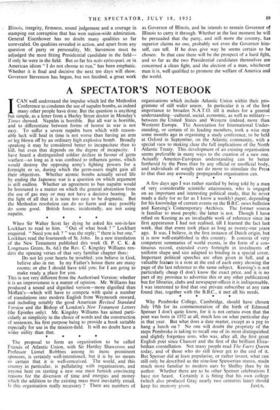PRESIDENTIAL CHANCES
THERE is a sharp distinction to be drawn between what General Eisenhower (his desire to be known as plain Mr. will clearly not prevail against the compelling force of use and wont) has already accomplished and what he has to accomplish still. His triumph at Chicago was spectacular. Till the last day or two at any rate no one expected him to equal Mr. Taft's vote on the first ballot. Actually he came within nine of securing the 604 votes needed to give him a majority over all competitors, and when Mr. Stassen immediately swung the Minnesota vote from himself to Eisenhower the fight was over. Both the cause and filo effect of the Eisenhower victory are important. The cause was mainly the dexterous use wade by the Eisenhower organisers of the Taftites' both moral and tactical lapse in disregarding the popular choice of delegates in Texas and other States and replacing those chosen by nominees of the machine. The cry of Fair Play by the General's sup- porters was fully justified, both in itself and as a campaign move, and it was raised so effectively as to invest the Eisen- hower Republicans by contrast with a cloak of virtue to which their own conduct of the campaign gave them a by no means indisputable title. But to leave the matter there would be very unfair to General Eisenhower himself. There can be no doubt that his own personality, with its transparent sincerity, which made his obvious unfamiliarity with electoral artifices and expedients an actual asset, was the chief ingredient in his vic- tory at Chicago. It will stand him in good stead in November, when a sterner battle will reach its climax, but, it will take a great deal more than that to carry him to the White House. The three and a half months remaining will give him as ample an opportunity of losing ground as of gaining it.
Mr. Taft's failure to secure the Republican nomination will have its consequences both at home and abroad. The choice before the Chicago delegates was not between two men but between two policies. One can be called broadly Conservative, one broadly Liberal. Taft had the backing of the Old Guard of the Republican Party, semi-isolationist, anti-Socialist to the point of bigotry, more concerned to defend privilege than to remedy social evils. Any statement about General Eisenhower's policy must be less specific, for he has so far gone a very short distance towards defining it. That has not mattered much in the campaign for the nomination, but it will matter a great deal in the campaign for the Presidency, and the chances of the politically inexperienced General putting his foot wrong are considerable. But that he will not go fundamentally wrong is certain. He means all the right things. His declaration on Monday that he "hoped to bring a message of militant faith and hope to the American people" is palpably genuine, but the American electors will want, rightly, to know much more than that about what General Eisenhower actually aims at in both the foreign and the domestic field. In the former he can at least claim the negative virtue of having saved the country— and Europe—from the effects of Taft. He is an internationalist; Taft emphatically is not. He believes firmly in the United Nations and the North Atlantic Treaty Organisation; Taft's faith in these organisations is so tenuous as to be hardly per- ceptible. Eisenhower, after his years as Commander-in-Chief of the Allied forces in the war, and of the N.A.T.O. forces since, has a clear understanding of the problems of Western Europe, and personal familiarity with the leading figures in the countries falling within that area. Mr. Taft enjoys neither of those advantages. The selected candidate might, it is true, be considerably embarrassed by the party's nationalistic foreign policy plank if he felt it necessary to be bound by it, but it is highly unlikely that he will. But if Europe, .while recognising that America's political battles concern herself primarily, has reason for satisfaction that Mr. Taft has not been chosen as Presidential candidate.
and some reason for satisfaction that General Eisenhower has, the ground for the latter satisfaction disappears if Eisenhower is not elected President. The chances that he will be are not to be precisely computed, but his hopes would appear to have little more than a fifty per cent. justification. There are three factors, each of them capable of proving decisive. One is the impression the General makes on the electorate between now and November; his personality and his military record, it must be repeated, are not going to be sufficient in themselves to induce the hard-headed American voter to back him. The second is the extent to which the Republican Party has been split by the Chicago contentions. The visit of the suc- cessful candidate to congratulate the unsuccessful, and the assurance by the latter of full support for the former, were edifying and in their way dramatic, but there is every sign that the angry Old Guard, and the Taft managers generally, are very far from disposed to support Eisenhower, even in the interests of a party to which disunity must be fatal; and it will be difficult for Eisenhower to conciliate them without alienating a considerable section of the floating voters without whose suffrages he cannot hope to win. The third factor is the Democrats' choice of candidate, about which much more will be known when the, party opens its convention next week in the hall the Republicans have so recently vacated at Chicago. The policy statement will in this case be less important, for the party is naturally committed to following in its main out- lines the course two successive Democratic Presidents and their Cabinets have been following since 1932. On only one point— racial equality—is any serious difference of opinion likely. Senator Russell of Florida, at the moment one of the two favourites for the nomination, is radically opposed to the con- cession of equal rights to negroes. His choice as candidate would disturb a large number of northern Democrats, which is in itself a reason why he is unlikely to be chosen.
The issue, therefore, so far as the nomination is concerned, is largely one of personalities, and it must be recognised that no outstanding national figure has so far appeared on the stage, though there is one lurking conspicuous in the wings. The one prediction that can claim considerable validity is that if Governor Adlai Stevenson can be persuaded to run he will stand quite as good a chance of election in November as General Eisenhower. That can be said with nothing like the same assurance of any of the other principal Democratic pos- sibilities. The objection to Senator Russell has already been mentioned. Mr. Harriman has many of the qualifications needed, but he has never been elected, or sought election, to any post in the past, and his career as a successful railway king will not commend him much more to southern Democrats than Senator Russell's views on negro rights do to northern. As a collector of delegates Senator Kefauver stands, so far, above either of these. He has campaigned assiduously and success- fully, but while he has the promise of more votes than any of his rivals they are far short of the 612 needed for election. His record as an exposer of graft is in his favour, but a Demo- cratic President could not make the clean sweep of functionaries (appointed as part of the "spoils system ") which is plainly needed; a Republican President could and would—by no means primarily for moral reasons. There are grave doubts, more- over, whether Senator Kefauver is really of Presidential calibre. About Governor Stevenson there is no such question. He has exhibited, as Governor of the important and populous State of Illinois, integrity, firmness, sound judgement and a courage in stamping out corruption that has won nation-wide admiration. General Eisenhower has no doubt many qualities so far unrevealed. On qualities revealed in action, and apart from any question of party or personality, Mr. Stevenson must be adjudged the most fitting Presidential candidate in the field— if only he were in the field. But so far his nolo episcopari, or in American idiom "I do not choose to run," has been emphatic. Whether it is final and decisive the next ten days will show. Governor Stevenson has begun, but not finished, a-great work as Governor of Illinois, and he intends to remain Governor of Illinois to carry it through. Whether at the last moment he will be persuaded that the party, and still more the country, has superior claims no one, probably not even the Governor him- self, can tell. If he does give way he seems certain to be chosen. In that case there will be the prospect of a hard fight, and so far as the two Presidential candidates themselves are concerned a clean fight, and the election of a man, whichever man it is, well qualified to promote the welfare of America and the world.



































 Previous page
Previous page